Hearing voices, feeling paranoid, disorganized speech – all symptoms of psychosis, and all more frequent in the college population. According to a 2016 assessment by the American College Health Association, 3 in 1,000 college students reported being diagnosed with schizophrenia, a chronic psychotic disorder. However, this number may underestimate the actual number of those with psychosis, because many have short-lived episodes due to stress, which over 31% of college students reported as affecting their academic performance. Other contributing factors included trauma, depression, bipolar disorder, and substance use.
A person might experience one symptom of psychosis or multiple symptoms. For example, a slight change in personality for one or two days could be attributed to increased stress. However; if symptoms persist seeking the advice of a mental health professional might be warranted. Psychosis symptoms can include:
- Hearing or seeing something that isn’t there
- A constant feeling of being watched
- Disorganized or bizarre speech or writing
- Inappropriate or unusual behavior
- Strange body movements or positioning
- Feeling indifferent or numb about important situations
- Deterioration of academic or work performance
- A change in personal hygiene and appearance
- A change in personality
- Increasing withdrawal from social situations
- Irrational, angry or fearful response to loved ones
- Inability to sleep or concentrate
- Extreme preoccupation or fears that seem bizarre
A psychotic episode in your college student raises many questions and can be unsettling. Psychology Today lists the top 10 things a parent should know about psychosis and your college student: Psychosis means the presence of at least one of the following: hallucinations, delusions, disorganized speech, and disorganized behavior. Hearing voices, having false beliefs, talking illogically, or behavior ranging from agitation to catatonic can be present during psychosis.
- A psychotic episode can be frightening. A college student who experiences a psychotic episode may believe they are “going crazy” or not “normal. They will often be embarrassed and hide their symptoms from you, and only seek help when they can no longer concentrate, or receive encouragement to get help from a friend.
- A psychotic episode does not have to mean the end your child’s academic career. Seeking treatment and making the right choices increase the likelihood your child will remain in school.
- Early and comprehensive treatment of first episode psychosis can reduce symptoms and improve school functioning. Studies show that typically people who experience psychosis have symptoms for more than a year before receiving treatment. It is important to receive effective treatment as early as possible, to reduce the duration of untreated psychosis. Early treatment, such as that offered at Pasadena Villa, includes family education, individual therapy, and vocational and educational counseling.
- Be a strong advocate for your child’s treatment.Many campuses do not have enough staff to offer mental health services for every student, so your child may need to obtain part or all care off campus. Contact a school representative or counseling center to find local resources.
- Psychosis could be one of the biggest challenges you face, especially if your child has ongoing difficulties in thinking or functioning that can occur in schizophrenia. Support groups offered by organizations like the National Alliance on Mental Illness will give you the tools to navigate through your child’s mental health journey.
- Regular sleep is essential in preventing a recurrence of psychosis. If your child has had a psychotic episode or a history of psychosis, adequate sleep is needed. Although college students can have wildly unpredictable sleep schedules, lack of sleep can trigger an episode and a regular sleep schedule is essential.
- Alcohol and drugs can increase psychotic symptoms in those who might be genetically vulnerable.Alcohol and drugs can increase the chance of psychosis, avoiding these substances will go a long way in reducing psychotic episodes.
- Psychosis can increase the risk of suicidal thoughts or behaviors. If suicidal thoughts are escalating, the hospital might be the safest place for your child. Commit to open communication with the medical team to assess if school or home is the best place for your child to go after discharge.
- Resilience. Hope. Recovery. Remember these words if your child has an episode of psychosis. Create a support system for you and your child. At Pasadena Villa, we welcome family involvement in the treatment process and make every effort to ensure the family is provided with updates and education on your loved one’s diagnoses.
College can be overwhelming for everyone. It is important to remember that your family is never alone. Pasadena Villa is also available to offer help. If you or a loved one would like more information on anxiety, depression, or other mental health or co-occurring substance use disorders, please call us at 407-215-2519 or complete our contact form.





